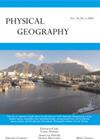了解喜马拉雅-喀喇昆仑地区冰上碎屑的空间分布和可能的成因
IF 1.4
4区 地球科学
Q4 ENVIRONMENTAL SCIENCES
引用次数: 0
摘要
摘要大多数研究都讨论了冰川上碎屑对冰川健康的影响,而喜马拉雅-喀喇昆仑(H-K)地区冰川上碎屑形成和区域分布的基本原理研究较少。本研究试图评估气象、地形和地质参数的作用,以了解H-K地区冰上碎屑的区域分布和可能的成因。根据归一化差异雪指数,使用LANDSAT-7数据(1999-2001)估计了约5000个冰川的冰川碎片覆盖率(FDC)。包括FDC在内的上述参数被汇编成一个综合数据库并进行分析。此外,ERA-5气候数据中的“2米空气温度”用于估计冻融周期的数量。总体气象和地形参数显示出与H-K区域FDC分布的显著相关性,FDC较低(<0.2)的冰川更为显著。FDC分布显示出对冰川高度的强烈依赖性,“极底重”冰川的FDC最高,“极顶重”冰川最低。岩性为石灰岩的冰川FDC最大,分布稀疏,但岩性为石英岩的冰川分布广泛,FDC较低。本文章由计算机程序翻译,如有差异,请以英文原文为准。
Understanding the spatial distribution and plausible genesis of supraglacial debris over the Himalaya-Karakoram region
ABSTRACT The majority of studies discuss the impact of supraglacial debris on glaciers’ health while the rationale behind the formation and regional distribution of supraglacial debris in the Himalayan-Karakoram (H-K) region is sparsely researched. The present study attempts to evaluate the role of meteorological, topographical, and geological parameters to understand the regional distribution and plausible genesis of supraglacial debris in the H-K area. Glacier-wise Fractional Debris Cover (FDC) for ~5000 glaciers have been estimated using LANDSAT-7 data (1999–2001) based on the Normalized Difference Snow Index. The aforementioned parameters, including FDC, are compiled into a comprehensive database and analysed. Moreover, “2-meter air temperature” from ERA-5 climatological data is used to estimate the number of Freeze–Thaw Cycles. Overall meteorological and topographical parameters show a significant correlation with the distribution of FDC across the H-K region, more prominently for glaciers having low FDC (<0.2). FDC distribution shows a strong dependency on glacier hypsometry with the highest FDC for “Very Bottom Heavy” glaciers and the lowest for “Very Top Heavy” glaciers. The glaciers with Limestone bearing lithology have maximum FDC and are sparsely distributed, but the glaciers with quartzite bearing lithology are widely distributed across the region and have lower FDC.
求助全文
通过发布文献求助,成功后即可免费获取论文全文。
去求助
来源期刊

Physical Geography
地学-地球科学综合
CiteScore
3.60
自引率
0.00%
发文量
18
审稿时长
6 months
期刊介绍:
Physical Geography disseminates significant research in the environmental sciences, including research that integrates environmental processes and human activities. It publishes original papers devoted to research in climatology, geomorphology, hydrology, biogeography, soil science, human-environment interactions, and research methods in physical geography, and welcomes original contributions on topics at the intersection of two or more of these categories.
 求助内容:
求助内容: 应助结果提醒方式:
应助结果提醒方式:


